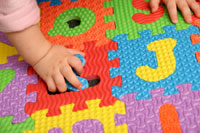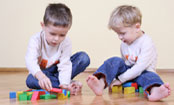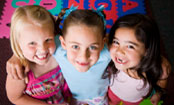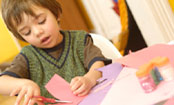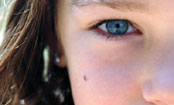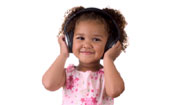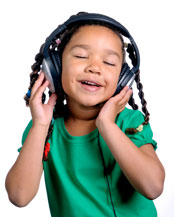
 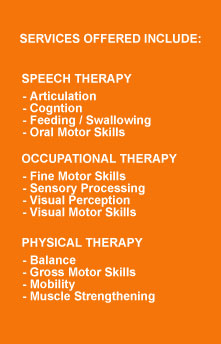
Occupational Therapy
Occupational therapy is the art and science of helping people perform the day-to-day activities that are important and meaningful to their health and well-being through engagement in valued occupations. It is the use of purposeful activity to maximize the independence and the maintenance of health of those who are limited by physical injury or illness, cognitive impairment, psychosocial dysfunction, mental illness, developmental or learning disabilities or an adverse environmental condition. Pediatric OT's are specialized in identifying the areas that your child may need help in to increase their functional performance in everyday task and encourage their participation in a variety of context. This includes teaching your child to better interact in their physical and social environments through play and functional activities of daily living.
Pediatric Occupational Therapist are also specialized in collaborating with families, caregivers, and teachers to help children, including those with disabilities, to live healthier, happier and more productive lives.
The occupation of childhood is to develop the skills necessary to become functional and independent adults. Here are some areas that and OT can address deficits through therapeutic activities. |
|
Fine Motor Skills:
Fine motor skills can be defined as coordination of small muscle movements which occur in the fingers, usually in coordination with the eyes. The development of fine motor skills allows a child to be able to complete tasks such as writing, drawing, and buttoning. Children need adequate dexterity, strength and coordination to control a variety of tools and objects in their daily routines such as writing utensils, scissors and eating utensils.
|
|
|
Sensory Processing (SI):
Sensory integration refers to how people process and use the information provided by all the sensations coming from within the body and from the external environment. Children with sensory integration problems may find everyday activities difficult, especially hair brushing, bathing, tooth brushing, dressing and even eating. They may have trouble with sounds, hearing, visual stimulation, speech, taste, smell or movement.
|
|
|
Cognition and Problem Solving:
Cognitive ability is what allows children to learn skills in all performance areas including, self-care, play and school. These skills are the foundation needed for the child to be able to perceive, attend to, and learn from their environment.
|
|
|
Psychosocial Skills :
These skills refer to the child's ability to interact with others. Having good psychosocial skills help children cope with new or difficult situations that may at times result in emotional outbursts. By acquiring these skills a child will learn to manage their behavior in socially appropriate ways. More importantly psychosocial skills influence the child’s ability to establish friendships and other social relationships.
|
|
|
Visual Motor Skills:
Visual motor skill is the ability to duplicate with the hands, that which is perceived with the eyes. This includes coordination of the hands together to complete duplication tasks of varying difficulty, such as managing the paper with one hand while cutting along a line with the other. Visual perception often influences a child’s performance with school related tasks.
|
|
|
Percepción visual:
Se refiere al proceso responsable de la recepción y el conocimiento de los estímulos visuales. La percepción visual permite a un niño hacer evaluaciones precisas de las dimensiones, la configuración y las relaciones espaciales de los objetos en su entorno.
|
|
|
Therapeutic Listening Programs:
Therapeutic Listening is an expansion of Sensory Integration. It is an auditory intervention that uses the organized sound patterns inherent in music to impact all levels of the nervous system. This program utilizes numerous CDs that vary in musical style, types of filtering, and level of complexity. The music on Therapeutic Listening CDs is electronically alte3red to elicit the orienting response which sets up the body for sustained attention and active listening. Therapeutic Listening coupled with SI tends to speed up the emergence of some of the following areas:
— Attention
— Organized Behavior
— Self Regulation
— Postural Control
— Bilateral Coordination
— Praxis
— Fine Motor Control
— Oral Motor / Articulation
— Social Skills
— Communication
— Visual Motor Integration
|
|

MAKING A DIFFERENCE IN THE LIVES OF CHILDREN AND FAMILIES WITH SPECIAL NEEDS
Helling Children's Center, L.P. | 12605 East Freeway, Suite 212 | Houston, TX 77015 | 713.453.0400 Office
|



